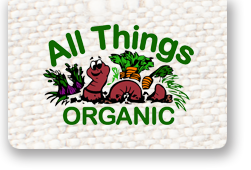Organic Compost Tea
Compost tea is a rediscovered and improved technique for delivering nutrients and microbial life to the soil and to plants' roots and leaves. Compost tea is also helping to change the way we look at soil and plant health. More and more growers are seeing the soil as a world with as complex a food web as that above ground, a web that must remain intact if there is to be healthy agriculture.
Organic compost tea is "brewed" by soaking good compost in highly aerated water, into which nutrients are added for rapid microbial growth. It is applied by being sprayed onto leaves (both sides) and drenched into the root zone frequently during the periods diseases occur.
The microbes delivered in compost tea help plants by out-competing anaerobic and other pathogenic organisms and by occupying infection sites on plants' root and leaf surfaces. Early tests are showing that well-made compost tea has properties that help give plants resistance to many diseases.
Making an organic compost tea involves several important steps 1) choosing the right compost, 2) choosing the right nutrients and 3) brewing and applying tea correctly. Let's look at each of these in turn. (Note that if you purchase any of the tea brewers listed below, the unit will come with instructions on correct tea brewing). Our instructions here are only meant to give you some background to tea making.
The compost used in making tea is like the starter you use in making yoghurt, or bread. The compost inoculates the tea with organisms. Thus, you want the compost to have a good diversity of beneficial organisms!
Plants differ in their soil preferences. Some need a bacterial-dominated soil, others want a fungal-dominated soil, and still others like a soil that's somewhere in between. A plant that prefers a fungal-dominated soil will benefit from a fungal-dominated tea, which you'd brew using a more fungal-dominated organic compost.
To make an organic compost with more fungi, mix in larger amounts of cardboard, paper, sawdust, wood shavings and heavy stalk plant material as you prepare the compost. For bacterial dominance, use food waste, green plant waste and livestock manure. (Most worm composts are highly bacterially-dominated because they are fed food scraps.) Whatever compost you use, be sure it is finished, well-stabilized compost, and that it's fairly fresh.
You'll brew using only dechlorinated water, so remember to leave the water out.
Brewing nutrients also influence the finished tea. To encourage the development of fungi in the tea, mix two parts humic acids, two parts yucca, saponin or aloe vera and one part fish hydrolyzate or other proteins into the water. For bacterial dominance, you'll feed one liquid ounce black strap molasses per gallon of tea and and an equal amount of cold-water kelp. For the molasses, you can also substitute brown sugar, honey or maple syrup if you like.
Organic Compost Tea vs. Leachate
Some bin manufacturers suggest that the liquid that drains out of a worm bin is compost tea. Bin instructions sometimes encourage worm bin users to pour water into their bins to get more "worm tea", as it's called. Unfortunately, this is leachate, not tea. It's a common misunderstanding. This leachate contains only a very small percentage of the nutrients and microorganisms of tea, as well as a significant amount of undecomposed organic matter, that will quickly cause the liquid to turn anaerobic. Be careful, and only give this liquid to your plants if it is still aerobic (your nose will tell you), and don't pour water through worm bins. Use only finished stable vermicompost and follow specific tea-making instructions.
If you want to try out tea, without investing in a brewer, you may be able to find tea at a local nursery or commercial compost producer. If you cannot find fresh-made tea, you may have to buy a tea brewer.


